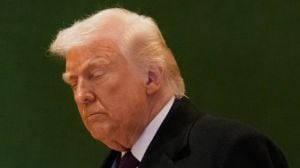Pakistan146;s Big MMA
Pakistan's political parties, apparently far apart in their ideological orientation, may soon prove the old adage that politics is the art o...

Pakistan8217;s political parties, apparently far apart in their ideological orientation, may soon prove the old adage that politics is the art of the possible. The recent elections have created a situation which virtually deadlocked the political process of government formation since even the major alliances did not produce a clear majority. Pakistan is willy-nilly headed for coalition governments, a system that its elites have been quick to condemn in relation to those in India. The secularist 15-party Alliance for the Restoration of Democracy, led by the self-exiled Benazir Bhutto8217;s PPP, along with the six-party Muttahida Majlis-i-Amil, MMA in short an alliance of Islamist parties, coming together to claim government formation would not only be a unique moment in Pakistan8217;s turbulent political history, but may have far-reaching consequences beyond the region.
Serious negotiations among these parties may well produce a commonly accepted policy agenda. The rise of the Islamist parties has been ascribed to the political vacuum created by General Musharraf8217;s policies of keeping out of the poll process the leaders of the two most popular parties that have ruled Pakistan alternately for more than a decade, till the army took over again three years ago. The PML-Q Pakistan Muslim League-Quaid e-Azam, the so-called 8216;king8217;s party8217; created by the army and the establishment for political leverage, if not actual governance, apparently has not led to the expected results so far.
The emerging coalition of the secularists and Islamists is working on the policy to be followed. This has promptly raised concerns even in Pakistan about the future of Pakistan8217;s support to the US war against terrorism in the region, especially since the MMA will form the government in the North West Frontier Province, and strongly influence policies in Baluchistan, the western region of Pakistan believed to be increasingly Talibanised and home to Al Qaeda cadres. Maulana Fazlur Rehman8217;s reported statement that the MMA would give more importance to issues like the Legal Framework Order under which Musharraf has re-appropriated Pakistan8217;s governance and foreign policy tend to lend strength to such apprehensions. At the same time, if such a coalition were to succeed, the Islamist conservative parties would have to shift closer to the centre. But how will the army react to the emerging scenarios? That8217;s the big question.
- 01
- 02
- 03
- 04
- 05






























